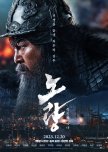
This review may contain spoilers
A potentially great drama fettered by unnecessary political propaganda and cultural posturing
The Yellow River is one of the longest running rivers in the world, and the second longest in China. While its length is eclipsed by the Nile and by its Chinese cousin, Chang Jiang, the Yellow River may just be the best candidate out of all major running waters in the world to illustrate the notion that Mother Nature is a b!tch. Indeed, successive Chinese dynasties have attempted to pacify the Yellow River, often without success. Under the Kangxi Emperor of the Qing Dynasty, the Chinese would once more attempt a pacification effort, thus the focus of this drama series.This drama starts off well, with a more realistic portrayal of the Qing Dynasty at work. The characters are not played by the so-called 'fresh meat' cadre that tend to plague everything else, and it is very refreshing. The Kangxi Emperor here is not an individual usually depicted as spending more time in his harem than governance, but an attentive ruler akin to his historical counterpart, who was a noted workaholic. Another highlight is the character of Empress Dowager Xiao Zhuang, the woman behind the man, who was a major influence in Kangxi's upbringing, and a key power-broker in the Dynasty, with a subdued performance from her actress to mirror her historical counterpart. Additionally, the trio of characters of Chen Huang, Jin Fu and Yu Zhen Jia all have strong performances from their respective actors.
Kangxi's endeavor to pacify the Yellow River was a major undertaking, and this drama did its best to display the efforts invested in regulating the water flow as well as the consequences when the efforts failed. Hundreds of thousands, if not millions of lives are affected each time a major flood occurs, and the survivors would have to contend with a shortage of shelter, food, medical supplies and worst of all, plague. Given the logistics of the era, entire villages could be wiped out before even a glimmer of government aid. Also befitting the subject matter, the Yellow River itself is not depicted with any hint of glamour, but as what it is in real-life, a giant stream of disgusting brown.
But, while the focus of this drama should be Kangxi's attempt to pacify the Yellow River, during mid-series, this crucial undertaking was rendered as a backdrop for other major events that took place during his reign. Unfortunately, this is where this series became marred by current Chinese politics, where its heavy-handed inclusion of frustratingly cringy propaganda reflected a very obvious attempt to appease the current Chinese administration. Take Kangxi's stance against Tsarist Russia to retain Outer Manchuria for example, this entire event, which weighed so much during the Qing Dynasty was glossed over in a number of episodes with fleeting mentions as to not poke Russian sensitivities given the cordial relations enjoyed by both countries today. In comparison, the conquest of Taiwan became paramount, a symphony of tears and blood, and the desire to reunify all Chinese under one roof, Han or Manchu. Hilariously, the Kangxi era was when sharp ethnic divisions made its way into society, with the Han ethnic group gradually being sidelined. Moreover, neither the Zheng nor Qing regime ever managed to conquer Taiwan entirely. Zheng regime's Tungning Kingdom contained only a sliver of territories in the South West of Taiwan that accumulated to less than 10% of the entire island, while the Dutch continued to maintain their presence in the North for a time. The Qing fared better and managed to extend their influence to the north of the island, but never beyond the central mountain ranges. Yet, this drama pretended as if the entirety of Taiwan was already under Chinese (Zheng) occupation, which cannot be further from the truth. Historically, the Qing Dynasty also made two serious attempts to appease the Zheng regime by granting the latter with de-facto independence, and if it was not for Zheng Jing's greed in his desire to retain mainland territories, history could have been rewritten. But, for obvious reasons, this fact is never mentioned. Another issue with this drama, just as with all other Chinese (palace) dramas, is the portrayal of the bureaucracy almost entirely as a group of scheming and corrupt individuals save for some key-figures. This portrayal often makes me wonder if future showrunners would stop their overreliance on this trope to prolong a series, any series.
Overall, a well-acted and solid series fettered by unnecessary political propaganda, in addition to the overuse of similar tropes found on just about every historical drama out there. Nonetheless, it is still one of the better Qing-era dramas, and I do recommend it as long as one can see past its obvious flaws.
Was this review helpful to you?

The personal costumes also left much to be desired. While not as inadequate as prior incarnations from shows depicting the same era, it was certainly nowhere near as painstakingly researched as the Longest Day in Chang'An. Not to mention the rubber armor worn by Ming and Nomadic warriors. Soldiers didn't look like soldiers, and amor didn't look like armor. Nomadic characters had it the worst, as their costumes were all over the place, including some that obviously looked like fantasy cosplay pieces purchased on a budget. Additionally, Nomadic characters behaved in a way that Chinese people thought they behaved, but not how they might have actually behaved.
Then came the war scenes, which were absolutely atrocious. Some scenes & dialogues were blatant ripoffs from existing movies, such as Lord of the Rings and Gladiator. This, coupled with bad costumes, made the war scenes prime candidate for the fast-forward button. Also, why the hell were the 'foreign' mercenaries all speaking English?
The only merit of this series came from the acting prowess of Wang Xueqi, who convincingly interpreted the third Ming Emperor, Zhu Di. In addition, the Emperor's interactions with his sons & grandson were the highlight of the show. Unfortunately, once he left the scene, the show dimmed significantly.
Overall, a terrible show with too many inprobilities that cannot be redeemed, with mediocre acting amidst some of the worst dialogues I can remember. Not something I'd recommend.
Was this review helpful to you?

This review may contain spoilers
Will we ever see an Imjin War movie that respects history?
Noryang: Deadly Sea depicted its namesake, the Battle of Noryang, which was the last major battle of the Imjin War, one where Ming/Joseon forces pursued a fleeing enemy, the Japanese invaders under Taiko Toyotomi Hideyoshi. Realizing the war was shifting rapidly against Japanese interests and with domestic unrest brewing, Toyotomi had made arrangements for an orderly retreat even while he was still alive. The sudden death of the Taiko however, meant whatever plans he had in motion went haywire. An opportunity where Ming/Joseon forces were all too happy to exploit.For the most part, the production values were excellent. Although it was obvious the actors were standing in front of a green screen on numerous occasions, the special effects team strived to render battle scenes and large fleet maneuvers as realistic as possible, something even Hollywood would be hard-pressed to replicate. In terms of costumes, I was particularly impressed with the costumes of all parties involved, which provided distinctiveness and displayed careful research. I was especially impressed by the movie's depiction of Ming armor, which was the most accurate yet in a Korean production, and even Chinese media companies could learn a thing or two from.
The uneven acting and abuse of artistic license unfortunately, was where this movie faltered. Japanese characters were either tyrannical villains or sniveling cowards, lacking any humanizing quality. Chinese characters were no better, as they were portrayed as arrogant buffoons with one sole exception. Then, once these 'foreign' characters started to speak, whatever seriousness this movie managed to muster at that point instantly fell apart. Chinese and Japanese characters (played by Korean actors) spoke in what should be their native tongue, but uttered their lines with great irregularity accompanied by the occasional over-the-top performance. This was obvious as most of them probably had no idea what they were saying. Japanese characters conversed with notable disconnected syllables, thick accents, pause in the wrong areas and overall seemed as if they were just reciting their scripts verbatim. The Chinese characters were even worse as their 'Chinese' was difficult to comprehend and became complete gibberish when delivered at a faster pace. The lack of understanding in how Chinese terminology should be applied also contributed to numerous instances of unintentional hilarity. For example, Chen Lin addressed Yi Sun-Sin as 'Lao Ye', roughly meaning old-master or lord-master depending on context. Except this would never happen since Chen Lin was actually older than Yi Sun-Sin, and also the latter's superior officer. Yi for his part, would never consider breaking protocol and suggest parting ways as that would have amounted to treason. Moreover, the relationship of the two men were known to be amicable, thus it was unfortunate that this movie chose to fabricate their mutual intense-friction for the sake of drama. To further signify Yi's skills in naval strategy, Chen also had to be made a moron, which led to the death of another key character, that of Deng Zilong. In reality, the latter met his demise by friendly fire while fighting onboard Admiral Yi's own flagship in midst of enemy formation. It was actually Yi's ship that was surrounded, and Deng was killed in action alongside Yi. But we cannot have Admiral Yi's reputation tarnished now, can we?
Furthermore, the plot was inconsistent. The movie informed us early on that Japanese forces were seeking to retreat and sought safe-passage in their negotiations with the Chinese since all parties involved at that point realized the Japanese could no longer maintain a presence on the Korean peninsula. Though near the end, somehow the battle became one of desperation for Ming/Joseon, and the Japanese fleet seemed as if it was more than capable of committing another serious naval campaign. Whatever the original objectives of the Japanese forces (one of retreat) were lost at that point.
With all the modern media revolving around the topic of the Imjin War produced by South Korea, there seems to be an implication that South Koreans believe Joseon Korea could actually win the entire war by themselves. This implication can be both blatant and subtle, depending on the production, but difficult to miss. In order to reinforce this notion, very often Joseon's Chinese allies were made feeble while their Japanese foes degraded to near cartoonish levels of villainy all for the purpose of portraying Joseon's efforts during the Imjin War to be more significant than it actually was. Especially when Admiral Yi is involved, and this movie is no different. While the production values were marvelous, excessive artistic license to prop up Joseon efforts marred by obvious language barriers in this movie reached a point where certain segments ranged anywhere from cringe to downright laughable. No one is disputing Admiral Yi's prowess as a naval strategist and leader of men, and stories focused on him should not require the degradation of everyone else around him. It is entirely possible to highlight his qualities while staying true to historical sources. It is not difficult.
Was this review helpful to you?

This review may contain spoilers
Are you too happy with your life?
Are you too happy with your life? Have you never experienced depression? If so, then the Promise of Chang'an will provide just enough depressionium for a healthy, balanced lifestyle!Warning: Overdosing on the Promise of Chang'an will induce uncontrollable tears, insomnia, rage, and occasional suicidal thoughts. If you are experiencing any of the aforementioned symptoms, please consult your physician immediately.
- - - - -
This drama is set in a fictional Chinese era, which itself was heavily inspired, if not outright a remake of 2002's Xiaozhuang Epic, with a touch of 2014's Empress of China. This is a well-acted piece, with elaborate costumes and setting. Though the armors worn by characters still need some improvements as they seem ill-fitting and impractical, even if warfare is only of secondary importance in this series. The music is your standard Chinese fare and largely forgettable, and at times cringeworthy when characters are shown playing instruments when it was obvious that they were not.
The story focuses on two main characters, Helan Mingyu and Xiao Chengxu, who fell in love early on in the story and one would expect them to unite at the end of it. As this entire drama was a work of complete fiction without corresponding historical eras or characters, I had no reason to not expect a happy outcome. Except such outcome never came, and I only begin picking up the cues after one-third of the series gone by. At that point, the ending became rather clear, though I continued watching, because this series introduced a little nuisance called: hope.
Throughout this series, the main duo had ample opportunities to 'set things right', but they never acted on it. Each time, when such opportunity presented itself, the main duo decided that, for some reasons of fealty and loyalty, they should not act in their own self-interest, even if there were numerous ways to get around this myriad of palace etiquettes for their own well-being. I remember staring at the TV set with rage upon witnessing one missed opportunity after another. Near the end, when the main duo decided to finally grow a spine and rekindle their relationship, doom & gloom drops, murdering any hope of that coming into fruition. This was extremely frustrating, as the light at the end of the tunnel was never reached even after numerous hints peppered throughout the series. Despite the ending becoming obvious, producers of this series counted on hooking the audience for the duration of this series, and they succeeded to a large degree.
The end of the show left a rather bitter taste in my mouth, and no, there is no re-watch value, because I am not a masochist.
Was this review helpful to you?



